
Sven Erik Alf Sjöberg was a Swedish theatre and film director. He won the Grand Prix du Festival at the Cannes Film Festival twice: in 1946 for Torment, and in 1951 for his film Miss Julie.
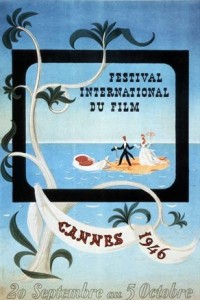
The 1st annual Cannes Film Festival was held from 20 September to 5 October 1946. Twenty-one countries presented their films at the "First Cannes International Film Festival", which took place at the former Casino of Cannes. Only one year after the end of World War II, most of the films were about the war. There arose several technical issues, such as the tarpauline cover blowing away in a storm on the day before the winners were to be announced, the reels of Alfred Hitchcock’s Notorious shown in reverse order, and Miguel M. Delgado’s The Three Musketeers projected upside-down.
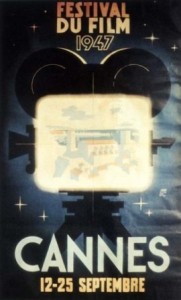
The 2nd Cannes Film Festival was held from 12 to 25 September 1947. The new building that was meant to host the festival, the Palais du Festival, was still not ready, and the festival was held amid many technical and financial problems. In 1947, the entire jury of the Festival were French. Six awards were given to films of different categories.

The 3rd Cannes Film Festival was held from 2 to 17 September 1949. The previous year, no festival had been held because of financial problems.

The 24th Cannes Film Festival was held from 12 to 27 May 1971. The Palme d'Or went to The Go-Between by Joseph Losey.

The 5th Cannes Film Festival was held from 23 April to 10 May 1952. As in the previous three festivals, the entire jury of this festival was made up of French persons, with Maurice Genevoix as the Jury President. The Grand Prix of the Festival went to the Two Cents Worth of Hope by Renato Castellani and Othello by Orson Welles. The festival opened with An American in Paris by Vincente Minnelli.

The 6th Cannes Film Festival was held from 15 to 29 April 1953. The Grand Prix of the Festival went to The Wages of Fear by Henri-Georges Clouzot.
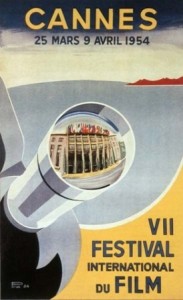
The 7th Cannes Film Festival was held from 25 March to 9 April 1954. With Jean Cocteau as president of the jury, the Grand Prix went to the Gate of Hell by Teinosuke Kinugasa. The festival opened with Le Grand Jeu by Robert Siodmak. This was the last festival with a predominantly French jury.

The 8th Cannes Film Festival was held from 26 April to 10 May 1955. The Golden Palm went to the US film Marty by Delbert Mann. The festival opened with Du rififi chez les hommes by Jules Dassin and closed with Carmen Jones by Otto Preminger.

The 9th Cannes Film Festival was held from 23 April to 10 May 1956. The Palme d'Or went to The Silent World by Jacques-Yves Cousteau and Louis Malle. The festival opened with Marie-Antoinette reine de France, directed by Jean Delannoy and closed with Il tetto by Vittorio De Sica.

The 10th Cannes Film Festival was held from 2 to 17 May 1957.

The 12th Cannes Film Festival was held from 30 April to 15 May 1959. The Palme d'Or went to the Orfeu Negro by Marcel Camus. The festival opened with Les Quatre Cents Coups, directed by François Truffaut and closed with The Diary of Anne Frank, directed by George Stevens.
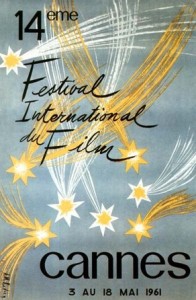
The 14th Cannes Film Festival was held from 3 to 18 May 1961. The Palme d'Or went to the Une aussi longue absence, directed by Henri Colpi and Viridiana, directed by Luis Buñuel. The festival opened with Che gioia vivere, directed by René Clément.

The 17th Cannes Film Festival was held from 29 April to 14 May 1964. On this occasion, the Palme d’Or was renamed "Grand Prix du Festival International du Film", a name that remained in use through 1974, after which it became the Palme d'Or again.

The 18th Cannes Film Festival was held from 3 to 16 May 1965. Olivia de Havilland became the first woman president of the jury.
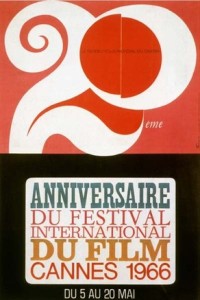
The 19th Cannes Film Festival was held from 5 to 20 May 1966. To honour the festival's 20th anniversary, a special prize was given.

The 20th Cannes Film Festival was held from 27 April to 12 May 1967. The Grand Prix du Festival International du Film went to the Blowup by Michelangelo Antonioni. The festival opened with J'ai tué Raspoutine, directed by Robert Hossein and closed with Batouk, directed by Jean Jacques Manigot.

The 26th Cannes Film Festival was held from 10 to 25 May 1973. The Grand Prix du Festival International du Film went to Scarecrow by Jerry Schatzberg and The Hireling by Alan Bridges. At this festival two new non-competitive sections were added: 'Étude et documents' and 'Perspectives du Cinéma Français'.

The 27th Cannes Film Festival was held from 9 to 24 May 1974. The Grand Prix du Festival International du Film went to The Conversation by Francis Ford Coppola.

The 43rd Cannes Film Festival was held from 10 to 21 May 1990. The Palme d'Or went to Wild at Heart by David Lynch.
























